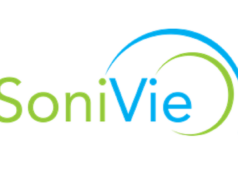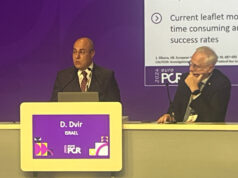
Twelve-month outcomes from the DESyne BDS Plus trial, evaluating a novel triple drug-eluting coronary stent system, support the safety and efficacy of the platform to address ischaemic and bleeding risk in patients undergoing percutaneous coronary intervention (PCI), investigators have reported.
DESyne BDS Plus (Elixir Medical) is a thin-strut stent system that uses sirolimus and two anticoagulants (argatroban and rivaroxaban) at the site of implant to deliver site-specific antithrombotic therapy, Alexandre Abizaid (Instituto do Coração, Sao Paulo, Brazil) detailed during a late-breaking trial session at EuroPCR 2024 (14–17 May, Paris, France) where he delivered results from the DESyne BDS Plus trial.
The coronary implant is designed to reduce thrombotic risk while eliminating the negative side effect of bleeding associated with oral anti-thrombotic use and to effectively address the challenge of managing ischaemic and bleeding risk in at-risk PCI patient populations.
In the trial, the device was compared against the DESyne X2 novolimus-eluting coronary stent system (Elixir Medical), with 200 patients randomised 1:1 to receive either therapy at one of 14 clinical sites in Belgium, New Zealand, Brazil, The Netherlands and Czechia.
The trial’s primary endpoint, target lesion failure (TLF) at day three or at hospital discharge, was shown to be statistically significantly lower with the investigational device than with the drug-eluting stent (DES) system.
“The current standard of care of combining oral antithrombotic therapies continues to pose serious challenges, especially in patients who are at high thrombotic risk and high bleeding risk, as managing the trade-off between ischaemic and bleeding risks is logistically unsustainable for healthcare providers and often results in delay of essential treatment decisions,” said Abizaid.
“These exciting results from the DESyne BDS Plus randomised controlled trial (RCT) demonstrate the sustained superiority in safety and efficacy of DESyne BDS Plus compared to a standard of care DES and underscore the potential for site-specific anti-thrombotic therapeutic (TRx) as a promising solution that effectively addresses the compromises we have to make between bleeding and thrombosis when using systemic drug therapies.”
The results shared by Abizaid demonstrated a significantly lower TLF rate of 2.1% for DESyne BDS Plus compared to 9.3% for the DES (p=0.03). There were no definite or probable stent thrombosis, cardiovascular death, or target vessel myocardial infarction (TV-MI) observed in DESyne BDS Plus treated patients.
“We are thrilled with the statistically significant 12-month clinical outcomes of the TRx platform validating the improved safety and effectiveness of site-specific TRx therapeutic for coronary PCI treatment,” said Motasim Sirhan, CEO of Elixir Medical. “Site-specific antithrombotic therapy can be a more effective approach to addressing ischemic risk without the risk and complications of bleeding associated with oral anti-thrombotics.”










